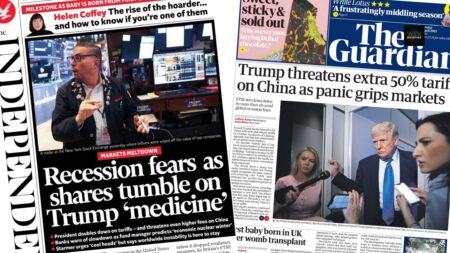Cliff Notes – Prince Harry’s back in court
- Prince Harry’s is back in court to appeal the level of police security he receives in the UK in the Court of Appeal, after a High Court ruling dismissed his challenge.
- The Duke of Sussex argues that his private protection team lacks access to critical UK intelligence necessary for his family’s safety, prompting him to request reinstatement of his previous security arrangements at his own expense.
- The Home Office has maintained that personal protective security cannot be funded privately, while Harry’s legal team claims his case deserves fair consideration under Ravec’s policies.
Prince Harry’s security case back in court – all you need to know | UK News
A hearing about Prince Harry’s security arrangements is starting today in the Court of Appeal.
The Duke of Sussex is appealing a ruling dismissing his challenge to the level of police protection he receives in the UK, and his case will be heard in front of three judges across Tuesday and Wednesday.
The prince’s dispute goes all the way back to 2020, and is one of several high-profile legal battles he has brought to the High Court in recent years.
So what is the case about and what has happened in the courts so far?
What is the dispute over?
Harry received full, publicly funded security protection until he stepped back from royal duties and moved to America with wife Meghan in March 2020.
Once he moved away, the Executive Committee for the Protection of Royalty and Public Figures (Ravec) – which has delegated responsibility from the Home Office for royal security – decided he would not receive the same level of protection.
But Harry has argued that his private protection team in the US does not have access to UK intelligence information which is needed to keep his wife and children safe.

He therefore wants access to his previous level of security when in the country, but wants to fund the security himself, rather than ask taxpayers to foot the bill after he stepped down as a senior member of the Royal Family.
The duke’s legal representative said in a previous statement: “The UK will always be Prince Harry’s home and a country he wants his wife and children to be safe in.
“With the lack of police protection comes too great a personal risk.
“In the absence of such protection, Prince Harry and his family are unable to return to his home.”
The legal representative added: “Prince Harry inherited a security risk at birth, for life. He remains sixth in line to the throne, served two tours of combat duty in Afghanistan, and in recent years his family has been subjected to well-documented neo-Nazi and extremist threats.
“While his role within the institution has changed, his profile as a member of the Royal Family has not. Nor has the threat to him and his family.”
What’s happened in court so far?
He filed a claim for a judicial review of the Home Office’s decision shortly after it was made, with the first hearing in the High Court coming in February 2022.
At the start of that hearing, Robert Palmer QC, for the Home Office, told the court the duke’s offer of private funding was “irrelevant”, despite his safety concerns.
In written submissions, he said: “Personal protective security by the police is not available on a privately financed basis, and Ravec does not make decisions on the provision of such security on the basis that any financial contribution could be sought or obtained to pay for it.”
He added Ravec had attributed to the duke “a form of exceptional status” where he is considered for personal protective security by the police, “with the precise arrangements being dependent on the reason for his presence in Great Britain and by reference to the functions he carries out when present”.
The barrister added: “A case-by-case approach rationally and appropriately allows Ravec to implement a responsive approach to reflect the applicable circumstances.”
The case didn’t conclude until 28 February 2024, when retired High Court judge Sir Peter Lane ruled against Prince Harry.
He ruled the decision to change his security status was not unlawful or “irrational”, and that there had been no “procedural unfairness”.
The judge added: “Even if such procedural unfairness occurred, the court would in any event be prevented from granting the claimant [Prince Harry] relief.
“This is because, leaving aside any such unlawfulness, it is highly likely that the outcome for the claimant would not have been substantially different.”

Following the ruling, a Home Office spokesperson said: “We are pleased that the court has found in favour of the government’s position in this case and we are carefully considering our next steps.
“It would be inappropriate to comment further.”
After the ruling, a legal spokesperson for Harry said he intended to appeal, adding: “The duke is not asking for preferential treatment, but for a fair and lawful application of Ravec’s own rules, ensuring that he receives the same consideration as others in accordance with Ravec’s own written policy.
“In February 2020, Ravec failed to apply its written policy to the Duke of Sussex and excluded him from a particular risk analysis.
“The duke’s case is that the so-called ‘bespoke process’ that applies to him is no substitute for that risk analysis.
“The Duke of Sussex hopes he will obtain justice from the Court of Appeal, and makes no further comment while the case is ongoing.”
In April 2024, Harry was refused permission to challenge the ruling by the High Court, but was told he could apply to challenge it again directly to the Court of Appeal.
He did so, and in June 2024 the Court of Appeal said it would hear the duke’s challenge following a direct application from his lawyers.
Granting the appeal, Judge David Bean said he was persuaded “not without hesitation” that Harry’s challenge has a real prospect of success.
The two-day hearing is set to start on Tuesday morning.





